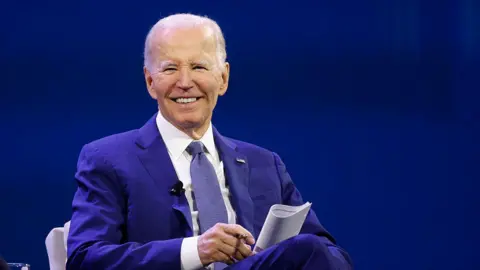Former US President Joe Biden is receiving radiation therapy as part of his treatment for prostate cancer, his spokesman has confirmed.
The spokesman also revealed that Biden, who is 82, is undergoing hormone treatment, although further specifics were not provided.
The radiation treatment is expected to last five weeks, marking a significant step in his ongoing care, according to sources.
In May, Biden's office disclosed that he had been diagnosed with a more aggressive form of prostate cancer that had spread to his bones. The diagnosis followed a report from Biden about urinary symptoms, which led to the discovery of a small nodule on his prostate.
At that time, a statement from Biden's office noted that he was diagnosed with prostate cancer characterized by a Gleason score of 9 (Grade Group 5), along with bone metastasis. While this indicated a more aggressive type of cancer, they asserted that it appears to be hormone-sensitive, which could facilitate effective management.
The high Gleason score indicates that the cancer cells have the potential to grow and spread rapidly. Biden left office in January as the oldest serving US president, with ongoing speculation about his health affecting his tenure and decision to not run for re-election.
His former vice president, Kamala Harris, has since taken on the role of the Democratic presidential candidate, though she lost to current President Donald Trump in the election.
Biden has long been an advocate for cancer research, notably resurrecting the cancer moonshot initiative in 2022, aiming to enhance research efforts and prevent over four million cancer-related deaths by 2047. This initiative has personal resonance for him, as he lost his son Beau to brain cancer in 2015.
Throughout recent months, Biden has largely kept a low profile. In May, he conducted an interview, his first since leaving the White House, where he spoke candidly about the difficult decision to withdraw from the 2024 presidential race.
According to the American Cancer Society, prostate cancer is the second most common cancer in men, with one in every 10 men projected to develop it at some point in their lives. Age remains the primary risk factor.




















